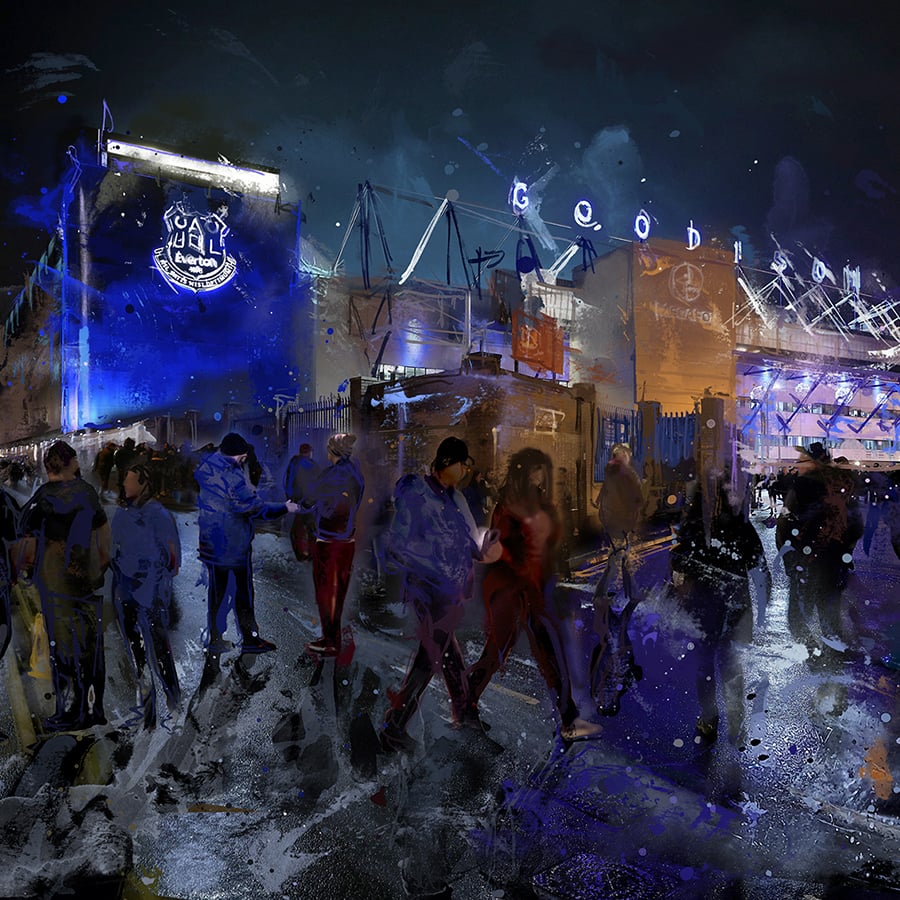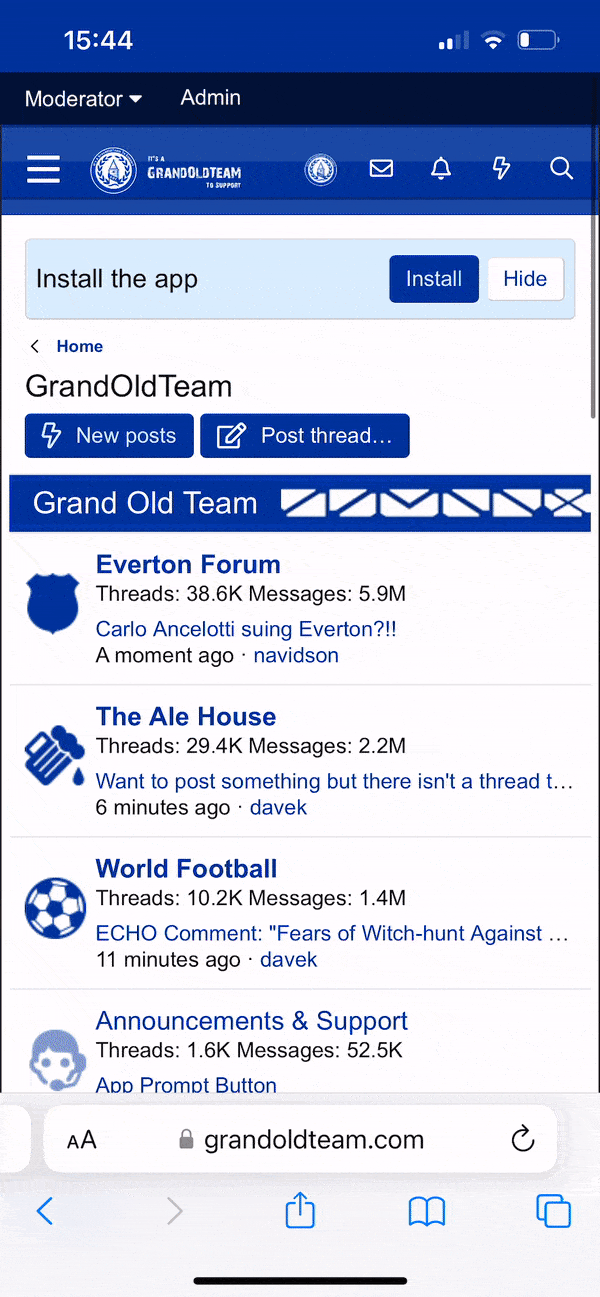The great TG probably world class when Dixie dean rated him higher than John Charles - Yet as a club we treated him awful..... the Everton way......



Follow along with the video below to see how to install our site as a web app on your home screen.

Note: this_feature_currently_requires_accessing_site_using_safari
TG Jones rises majestically in the air - my late father stated the finest defending footballer ever to be seen of his era -
View attachment 59511
My late father described him to me as unbelievable in that era - as a centre half he dribbled the ball out of dence- he had a thunderous shot with either foot - he could pass a through ball without looking - he sent passed on the deck to a winger with ease with distance on the deck - he headed a corner back to Ted Sager - he shone out like a becon as he ozzed pure class........Like use of arms. He wouldn't get away with it today ......unless playing for RS.
With respect Joey, Latchford should never be mentioned with all those great players. For the umpteenth time, he never scored for Everton against the RS.View attachment 59514
7: Kevin Ratcliffe
The Welsh international was made Everton captain by Howard Kendall in 1983 at the tender age of 23. Whilst captain, Ratcliffe led Everton to one of their most successful spells in the club’s history, winning the 1984 FA Cup Final, the League Championship in 1984–85 and 1986–87 and the UEFA Cup Winners' Cup 1984–85.
6: Bob Latchford
Once the most expensive players in the English League, Latchford’s £350,000 move from Birmingham City to Everton came with expectation; an expectation that was met. The free scoring striker scored a total of 106 goals in 236 appearances for Everton, becoming the club’s top scorer during the 1975, 1976, 1977 and 1978 seasons.
5: Howard Kendall
Howard Kendall was a magnificent servant to Everton in his playing career, most notably as part of the famed Kendall-Harvey-Ball midfield trinity in the late 1960's and early 1970's.
But it is his additional time as a manager with the Goodison Park club which edges him into this list, particularly for his first spell in charge between 1981 and 1987. Kendall made 229 appearances for the Toffees and scored 21 goals before joining Birmingham City in 1974 as part of the deal which brought Bob Latchford to Everton.
Kendall began his managerial career with Blackburn Rovers in June 1979 and guided the club out of the old Division Three before just missing out on promotion to the top flight on goal difference in 1981. The lure of his former club was too strong to resist when Gordon Lee left Everton, and Kendall rejoined the club as player-manager and made a further four appearances for the team. After two seasons of steady progress and a campaign by some disillusioned supporters to get rid of him, Kendall won his first trophy with the 1984 FA Cup win over Watford.
The league title was twice won in 1985 and 1987 along with the European Cup Winners' Cup in 1985, the same season in which only a Norman Whiteside goal for Manchester United denied him the domestic Double.
Kendall left for Athletic Bilbao in the summer of 1987, but returned twice for less successful stints in charge of the team between 1990-1993 and 1997-1998.
4: Brian Labone
Labone joined Everton in July 1957 instead of going to university, and went on to become one of the club's greatest legends.
Labone's record of 534 appearances for the Blues remains a club record for an outfield player, and he captained the team in the 1966 FA Cup Final win over Sheffield Wednesday and during the title-winning season of 1969-70. He was also a member of the Everton team, which won the First Division championship in 1963.
He withdrew from the England squad for the 1966 World Cup Finals due to his impending marriage, but played in three of the four matches for his country at Mexico 1970. The defender won 26 caps in total.
Labone retired from playing in 1971 after suffering a serious Achilles injury, but maintained a long-standing association with the club until his death in April 2006.
When Labone passed away after an appearance at a supporters' awards evening at the Winslow pub opposite Goodison Park, a piece of Everton went with him.
3: Neville Southall
Neville Southall arrived at Everton in 1981 as the least-famous member of a group of signings bought by new manager Kendall, dubbed the 'Magnificent Seven'. The goalkeeper left Goodison Park in 1998 as the club's record appearance holder (751 games), a host of medals and a mine full of memories for Everton supporters. Southall joined from Bury for £150,000 at the same time as another goalkeeper Jim Arnold from Blackburn, who was considered to be Kendall's No.1 at the time.
But it was the Wales international who would go on to surpass all records at Goodison Park, and was the only member of the 1985 squad to still be on the team when Everton won the FA Cup against Manchester United 10 years later. Southall also got on the score sheet during his time at Goodison Park when he took a spot-kick in a penalty shootout against Charlton Athletic in the Full Members' Cup.
2: Alan Ball
Alan Ball signed for Everton in a British record £110,000 deal from Blackpool just a month after winning the World Cup with England. The midfielder with the white boots would go on to become an Everton legend within weeks of his first season at the club when he netted twice in a 3-1 win over arch-rival Liverpool.
Ball had skills and talents which have rarely been matched at Goodison Park, and he won his only major honour at club level as part of the 1970 First Division title-winning side. When Ball left for Arsenal in 1971 for £220,000, he was just 26 years old and at the peak of his ability. The outpouring of grief was tangible among the Everton supporters.
Ball once said, "Once Everton has touched you nothing will be the same," and his mutual love for the club and the supporters never wavered as he furthered his career beyond Highbury with Southampton before moving into management with Portsmouth, Southampton and Manchester City.
When Ball died in April 2007, almost a year to the day after former teammate Labone, there was no greater grief in football than at Goodison Park.
Everton’s greatest ever player: William Ralph
William Ralph Dean or Dixie Dean is arguably, the greatest striker England has produced, let alone Everton.
The Birkenhead-born player joined the Goodison Park side from Tranmere Rovers in 1925 for £3,000 and went on to set record after record for the team he supported as a boy.
Dean scored 32 goals in his first season at Everton before a motorcycle accident in 1926 saw him suffer a fractured skull and jaw. But Dean was teak-tough and he bounced back in style, and his 60 goals in 39 league appearances is a record which is unlikely to be broken as Everton cruised to the title.
Everton were relegated in 1930, but Dean refused to leave the club and he helped the Blues back into the top flight in 1931 before capturing the league title the following season. Dean scored in the 1933 FA Cup Final as Everton beat Manchester City 3-0 at Wembley.
Dean left Everton in 1937 and signed for Notts County the following year and the outbreak of World War II saw his playing career end. Dean had not visited Goodison for several years due to ill health when he visited the ground to see Everton take on Liverpool in March 1980. He passed away moments after the final whistle.
you could add a hell of a lot more......
That's why I put there are many more ........With respect Joey, Latchford should never be mentioned with all those great players. For the umpteenth time, he never scored for Everton against the RS.
He hid from the likes of Tommy Smith and all too often left the fighting to Mick Buckley & Mick Lyons, two Bravehearts.
